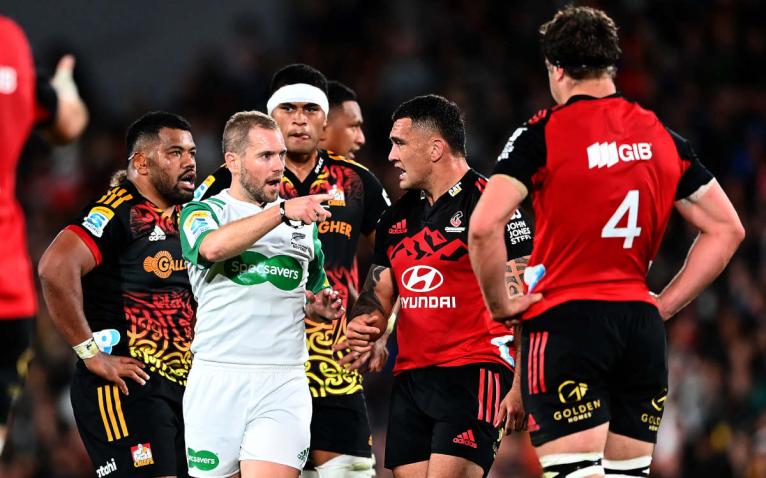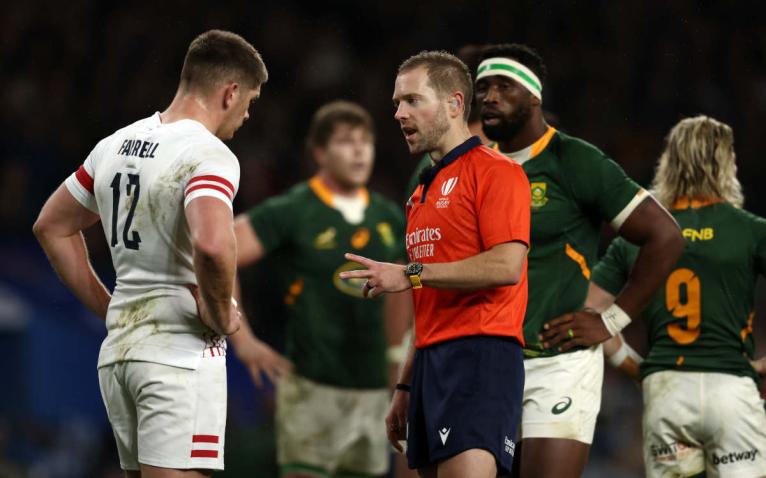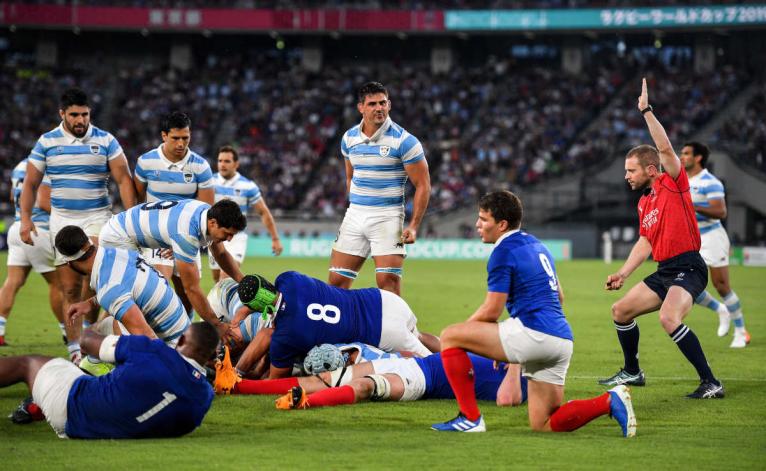Angus Gardner can remember the words vividly, as if it were yesterday. “No more rugby. No more contact sports. You may as well take up fishing.”
It was then the tears flowed. As a rugby-mad teenager, who had fallen in love with the sport as an impressionable six year-old watching his hero David Campese goosestep his way to victory and Nick Farr-Jones take the William Webb Ellis Cup from The Queen in 1991, the youngster from Sydney had thrust himself into the game and was a handy half-back at Shore School in his formative years. Then the pain and spasms started.
Gardener was referred to hospital, where MRI scans showed a rare hereditary called Scheuermann’s disease, which affected the lumbar spine. In essence, they were half the width they needed to be and he was told in pretty stark terms that rugby was a ‘no-no’ due to the impact and force exerted in a full-throttle contact sport.
Speaking to Gardner all those years later, he still recalls the words pivotal moment in his life with a mixture of animation and disbelief. “Mate, I was devastated. You can ask my mum, I pretty much started crying there and then.”
Left with an option of playing tiddly-winks or chess, while his mates played compulsory winter sport, in a sliding-doors moment, Gardner was approached by a teacher at the school who ran the referees programme. He tentatively asked Gardner if he’d be interested in helping out on the weekend. News had travelled over his plight, and he also asked if Gardner was interested in doing a referee’s course. “I was told I couldn’t participate in the games my peers were involved in but could be set up with a few junior games and most importantly, stay involved in rugby. I had nothing to lose.”
First impressions, however, weren’t favourable. “I was desperate for anything at that point but to be honest, I hated it. There were vocal parents on the sideline and I felt pressure to get decisions right but through continual encouragement, I got to the point I persisted through to the end of school.”

A hobby to while away the time and keep fit, continued until the end of his formal education, when his next turning point came. “I was ready to head off to university and leave it at that, but I was told the New South Wales rugby referees were conducting a recruitment drive, looking at all the schoolboy referees on file. They asked if I’d be interested in joining their association and refereeing some senior footy. It would be one training session a week, good camaraderie, and I’d have a game on the weekend.”
For a princely sum of ‘40 bucks’, which was his beer money as a student, Gardner was on the pathway to refereeing at the top level, but he still had choices to make after graduating in Property Economics. “Over time, refereeing reignited my passion for rugby in terms of the values of the game. I felt part of something. I felt I had a connection with rugby and that meant something to me.”
After getting a job in property he soon made my way up through the ranks to refereeing first grade games in Sydney and it wasn’t long before he was running touch at Super Rugby. “I did two or three games a month, whilst working for a property developer in Sydney. If I had a Friday game in Brisbane, I’d do a half day’s work and then ref the game, but it got to a stage where they said ‘you need to decide. Is it us, or refereeing?” I said to them, ‘rugby is my passion, my dream. Not many people in life get to do what they’re passionate about and I didn’t want to look back with any regrets. To be fair they backed me 100 per cent and I still have the qualifications and experience to fall back on at a later stage.”
Since that fateful day in his youth, of course, Gardner has gone referee more than 100 Super Rugby games and will take up the whistle for this year’s Rugby World Cup, as one of the game’s elite professional refs.
I’d say preparation is key. Firstly, there’s the lead up to the game. The butterflies, excitement, and the organisational piece around it. The end point is the game and I work backwards.
With a decade of full service behind him, it begs the question whether there are certain personality traits that are well-suited to being a referee. “That’s a good question. I reckon most referees are process-focused types of personalities. My role was a project manager, where it’s, ‘how do we get this off the ground? By doing this, this and this.’ Look at Barnsey (Wayne Barnes), he’s a barrister. Ben O’Keeffe is a trained doctor. People who are a little bit OCD, I guess.”
For those armchair experts who think they could do better than the professionals and fancied giving refereeing a craic, Gardner says the role is demanding, but immensely rewarding. “For anyone thinking about moving up the ranks, I’d say preparation is key. Firstly, there’s the lead up to the game. The butterflies, excitement, and the organisational piece around it. The end point is the game and I work backwards. You know, how do I get myself into the best state to be ready for Saturday? That includes how I manage my travel, sleep, family commitments and fitness. Then there’s the execution, which is the game and afterwards, the post-mortem or the self-congratulation.”

Refereeing is anything but dull and Gardner say it offers the closest thrill to being a player. “I find it a real roller-coaster. It’s such an adrenaline rush and I can see how people get addicted. There are these massive highs, but also these incredible lows. After a game, if you can walk off the pitch where no one is talking about you and there has been no controversy, mate, that’s a nirvana for us. You want everyone talking about the teams and players. If you don’t warrant a mention and you think, ‘wow, perfect’.”
Looking back at his first decade, Gardner says demands have increased but that refereeing is, without a doubt, in a better place compared to when he started out. “The biggest change is undoubtedly social media – it has changed the game forever. Within 10 minutes of the game finishing, every single controversial decision is online. That just never happened back in 2012. I’ll give you an example. Early on, I had an absolute train wreck in the game between the Blues and the Lions, but the highlights only came out two or three days later and nothing was said. These days, people have opinions, which gain momentum and before you know it, it goes viral and there’s no going back. It’s the world we live in.”
There are other facets which have increased the scrutiny on the officials in the name of entertainment. “The technology has kicked on hugely. Games weren’t in hi-def a decade ago. We have double the amount of cameras at games, spider-cam, ref-cam – we never had that before. All these extra elements have been added in the name of entertainment. We understand that as refs, we add to the entertainment value, but correspondingly, we also have Damocles’ sword above us for 80 minutes. Communication is a key part of the job and Nigel (Owens) was the best in the business. He got to the level we all aspire to. I still text him regularly to see how the cows are.”
TJ Perenara is the only player who has ever made me a decision on the field. TJ is very smart, and I still enjoy dialogue with him even now. He’s a real competitor and really challenges you.
Gardner would encourage fans who don’t quite understand the game’s laws to take up refereeing. “I’d say the special thing about refereeing is keeping connected to rugby. Stepping into the refs’ shoes is a massive part of the giveback for the rugby community. I take my little boy George to rugby, and I’ll put my hand up to referee. It’s a great way to challenge yourself and your understanding of the laws but also your fitness, focus and concentration. At the community level, you are often there by yourself so it’s you and 30 players. It’s how you work through that.”
Another part of the game Gardner thrives from is the dialogue with the players, with one name, in particular, standing out. “TJ Perenara is the only player who has ever made me a decision on the field. TJ is very smart, and I still enjoy dialogue with him even now. He’s a real competitor and really challenges you. It was in a Reds v Hurricanes game in 2015. He went for a quick tap five metres out from the Red’s try line and went over and scored. The TMO came in and said, ‘we need to check this, I don’t think he actually tapped the ball’. We looked on the big screen, and I said, ‘nope, you haven’t touched the ball, so I’ll disallow the try’. I said, ‘I need to pull you back and penalize you for not tapping it properly, and he said, ‘nah, that’s not the law, the law is it’s a scrum to us’ and I said, ‘I think you’re right’. It makes me laugh to this day.”
Having travelled all over the world, the other player he enjoyed a playful contretemps with was former Ireland captain, Rory Best. “I refereed Ireland quite a few times. I liked Rory and the manner he approached referees. It was really polite but often with a challenge and he’d keep that up for the full 80 minutes. He managed to do it in a manner in that didn’t overstep the line. Sam Warburton had a similar skill.”
One aspect of modern refereeing that cannot be overlooked is the criticism, and often flat-out abuse online. Gardner meets this thorny subject with a sigh. “I feel like the other codes often let us down because it’s so commonplace in soccer when you see players hounding the referee. Even in NRL over here in Sydney, there’s precious little respect, and the AFL isn’t much better. In rugby we get that attitude spilling over.”
Listen, we are our own harshest critics. You can’t explain the feeling you have when you’re coming off the pitch after a Test match and you know you’ve made a mistake. It is torture. I can’t sleep the night after.
There is a widespread acceptance within refereeing ranks that pundits and fans will have their opinion and they’re entitled to it, but we have to be thick-skinned as referees, but there’s a line. “We can’t control that, but as a sport, we need to look hard at the stakeholders within our game, like the coaches. There’s been a few instances where they have been very vocal. As refs, we accept some of the flak will come our way, but the values of the game are what makes it special, so my message is let’s not lose them.”
His response to any fans that don’t think referees care is unequivocal and leaves little room for interpretation. “Listen, we are our own harshest critics. You can’t explain the feeling you have when you’re coming off the pitch after a Test match and you know you’ve made a mistake. It is torture. I can’t sleep the night after. People probably think you go home, have a beer and forget about it, but for weeks afterwards, I’m still replaying it in my mind. I’d love for people to understand that we beat ourselves up no end when we don’t get it right. You put so many hours perfecting what you do, all the training and sacrifices you make, and if it goes wrong, you think, I’ve let myself down, I’ve let my family down.”

With a third Rugby World Cup to look forward to, Gardner says rugby is still innovating and trying to push the envelope as it continues to evolve. “There have been some really successful new laws. Look at the 50-22, that’s a great addition to the game. Another is the goal-line drop out, which stops countless five metre scrums and puts pressure on us to have to make a decision. I know we are looking at a bunker system, which has just been announced. Obviously, it’s had a lot of success in NRL down here in Australia and also what it does is takes some of the pressure off the on-field team to make a big call in the moment.”
An example of where the new bunker system could improve the game is given with Jaco Peyper red card decision with Freddie Steward in the Ireland v England Six Nations game. “If he’d had an opportunity to defer that to the bunker and given them a bit more time to consider it with two or three people, it may have lessened the pressure on Jaco, so I can see its merit. When you roll out something this close to the World Cup without giving it a big trial, there are always challenges around it, but it’s really exciting idea.”
Next time, you barrack a referee from the comfort of your sofa, or from the stands, it maybe an idea to count to ten. These individuals are rugby’s unsung heroes and should be protected at all costs.
If you fancy honing your understanding of rugby’s laws, why not pit your wits with this online learning system https://www.world.rugby/the-game/laws/home



Great article...but he was confused during force vs drua...same scrum infringement and 4 different ruling....first 3 penalties to drua, then 2wice told 9 to use ball, then 3 resets, than awards force 2 penalties late in the game...frustrating...no wonder why french and English refs are way better
One of the better refs who makes an effort to communicate with the players. Same cannot be said for other Tier 1 refs...one in particular, who has the ability to stymie a game simply by being utterly devoid of personality and an understanding that its a game for fans as well as players. He is sadly in the WC refs squad.
Definitely one of my favourite refs and ahead of Berry. I love his little brain fades, I remember once Aaron Smith having to remind him that time was up!
Great article. Even as someone who only refs at colts level and below, I can see that the top refs face the same challenges writ large. I only take issue with the parting shot about the bunker... Given that the Steward call was essentially made by Marius Jonker and Peyper didn't examine some of his more categorical statements (like that Steward had a clear line of sight and time to react, both of which were debatable), the success of the bunker depends very much on having the right balance of technical refs and people with a feel for the game involved.
Jonker (and some other TMOs) tend to call things that are not clear and obvious. The better refs are not afraid to overrule them. A good example happened in the Tigers v Quins game - the TMO called for a card on the basis that Louis Lynagh was not in position to contest the the ball when he collided with Mike Brown, but Ian Tempest demanded replays from different perspectives until he could see where Lynagh was in relation to the ball and (correctly) concluded that he was in position to contest the ball and was under no obligation to jump for it, so it was just a rugby incident.
TO work, any bunker needs to include a senior ref who is experienced in managing the TMO process from the field, with a distinct role from the TMO.
Refs like a fisherman. No feel for the game but the best in Australasia.
Great to see how he has progressed to be a great ref.
Best ref around. Let’s the game flow - most of his games are a pleasure to watch compared to other refs who appear to look for infringements for the sake of it.